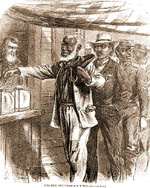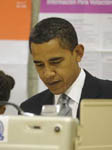A Tale of Two Blawgs
 It may be a new story that is already old, but here’s my own example of the role blogs can play in legal scholarship. A post on my personal blog is turning into a paper. But before I can complete the paper (I was well into another project), a case comment in the Harvard Law Review has responded to my idea.
It may be a new story that is already old, but here’s my own example of the role blogs can play in legal scholarship. A post on my personal blog is turning into a paper. But before I can complete the paper (I was well into another project), a case comment in the Harvard Law Review has responded to my idea.
I am working on a paper discussing the potential implications of the Supreme Court’s decision last term in Davis v. FEC, striking down the “Millionaire’s Amendment” to the Bipartisan Campaign Reform Act (more commonly known as the McCain-Feingold Act). This provision increased the campaign contribution limits for candidates facing an opponent who has self-funded in excess of a trigger amount. So, if a wealthy self-financing candidate (like our own Sen. Herb Kohl or Rep. Steve Kagen) spends a sufficient amount of his or her own funds, the amount that individuals and party committees are allowed to contribute to his or her opponent increases. The Court, in a 5-4 decison, found that this provision is an unconstitutional burden on the self-financing candidate’s free speech rights.
The essential point of the paper, made on the very day that the decision came down on my personal blog (note to the Dean: see your summer research dollars at work), is that, when considered with the Court’s decision in Wisconsin Right to Life v. FEC during the previous term, Davis may well render public financing schemes unworkable.

 In November, 1868, the newly freed slaves in South Carolina turned out to vote in the first presidential election they had ever been allowed to participate in. It was a momentous occasion; hundreds of thousands of persons who had been deprived of their rights for centuries were now finally able to enjoy all of the privileges of citizenship, including the right of suffrage. Voting in the 1860s meant travelling long distances to the county seat to cast a ballot, often requiring an overnight stay; it was an arduous process, but they were eager to make the attempt.
In November, 1868, the newly freed slaves in South Carolina turned out to vote in the first presidential election they had ever been allowed to participate in. It was a momentous occasion; hundreds of thousands of persons who had been deprived of their rights for centuries were now finally able to enjoy all of the privileges of citizenship, including the right of suffrage. Voting in the 1860s meant travelling long distances to the county seat to cast a ballot, often requiring an overnight stay; it was an arduous process, but they were eager to make the attempt.